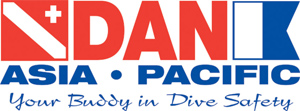DIVE SAFETY
DIVERS ALERT NETWORK
 Scuba Culture is proud to support DAN Asia-Pacific (DAN AP). The Divers Alert Network (DAN) is a global network of not-for-profit, member-based, dive safety organisations working for the safety of all divers through education, research and training.
Scuba Culture is proud to support DAN Asia-Pacific (DAN AP). The Divers Alert Network (DAN) is a global network of not-for-profit, member-based, dive safety organisations working for the safety of all divers through education, research and training.
DAN AP provides Worldwide Emergency Evacuation Coverage and optional Dive Injury (Treatment) Insurance Services for Members. In addition the organisation is responsible for funding and/or manning 24-hour diving emergency hotlines throughout the Asia-Pacific region.
DAN AP is a part of the International DAN Federation of Dive Safety Organisations with worldwide Membership presently exceeding 300,000.
Wherever members live or dive around the world they have peace of mind knowing that DAN is available 24-hours a day, 7 days a week to assist in the event of an accident/illness.
WHY IS IT SO IMPORTANT THAT AS DIVERS WE ARE PROTECTED WITH DAN MEMBERSHIP & DIVE INJURY (TREATMENT) INSURANCE?
It’s all about being prepared for the unexpected, namely dive accidents and illnesses. It’s essential that divers have a reputable organisation to call that will be able to co-ordinate a rescue effort and get them to the most appropriate treatment for their injury or illness. And then there is the issue of cost. DAN protection ensures the diver will not be lumbered with the burden of a potentially hefty invoice in the event of an accident or illness.
The essence of DAN Membership & Dive Injury (Treatment) Insurance is about being prepared. DAN offers members peace-of-mind, which comes from knowing they have the experts in diver accident management to call in the event of a diving accident or illness.
TO LEARN MORE ABOUT DAN, OR TO BECOME A MEMBER, VISIT WWW.DANASIAPACIFIC.ORG
AN EXAMPLE
In 2007 DAN was involved in the evacuation of a paralysed diver from the Solomon Islands to Australia. The evacuation cost was around AUD$90,000 (as an aircraft had to be sourced from far away). In addition, the treatment costs were in excess of US$30,000, plus on-going expenses.
